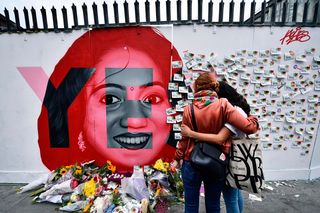The dark side of nostalgia - can our obsession with the past have negative consequences?
From 'Ready Player One' to 'Stranger Things', retro references are everywhere today
Blast from the past: Ready Player One and Stranger Things are heavy on nostalgic references. Photo: Jaap Buitendijk
If you fancy a super-sized serving of nostalgia, Steven Spielberg's Ready Player One is the retro romp you've been waiting for.
Eighties blockbusters, old video games, comic books and cult science fiction are rifled with glee by the director's $175m adaptation of the 2011 Ernest Cline bestseller.
Spielberg even plunges down a cinematic hall of mirrors via winks towards his own creations such as Back to the Future (which he executive produced) and 1993's Jurassic Park, alluded to with an early cameo by a rampaging T-Rex.
Ahead of its release on Thursday, anticipation for the film is approaching fever pitch. After years without a significant hit - his 2016 adaptation of Roald Dahl's The BFG was a stone-cold flop - Ready Player One looks set to restore 71-year-old Spielberg to his rightful position as popcorn entertainment's once and future king.
The big surprise is that any of this could be considered shocking. In Hollywood and elsewhere, nothing sells nowadays like nostalgia. Netflix's biggest smash, Stranger Things, is an unabashed love letter to 80s geek culture, with references to Dungeons and Dragons, Ghostbusters and vintage synth-pop (all of which receive a hat tip in Ready Player One).
The success of Disney's rebooted Star Wars movies similarly speaks to the allure of pop culture touchstones from a generation ago.
Where the original Star Wars films were aimed at kids, these new sequels are pitched unabashedly at middle aged multiplex goers whose childhood unfolded in the shadow of Luke Skywalker (inevitably Ready Player One contains its own Easter eggs).
The screen isn't the only place colonised by nostalgia. Rock 'n' roll is still trying to slip free of the headlock of punk and grunge, with 90s indie rock the current sound deemed ripe for rejuvenation (a comeback album by post-grunge outfit The Breeders is among the year's most approvingly reviewed).
More darkly, it can be argued that Brexit is rooted in a yearning among a certain demographic in the UK for a time when the world was more straightforward: Blighty ruled the waves, foreigners - the uppity Irish among them - knew their place. In a similar vein, what could be more nostalgic than Donald Trump's battle-cry of 'Make America Great Again'?
The connection between right wing politics and nostalgia is supported by research from Utrecht University in the Netherlands, in which participants were asked questions such as: "How often do you long for the good old days of the country?"
There was, it was discovered, a correlation between a longing for the past and a tendency to view immigrants in a less positive light.
"In the Netherlands," the authors of the study said, "the extreme-right wing is growing more popular, and they are using the rhetoric of nostalgia to attract voters." Nostalgia, it should be recognised, isn't always a negative.
Holding on to an idealised vision of the past can be an important comfort during difficult times, psychologists have found. Nostalgia can make a person more optimistic about the future, a study in the Journal of Personality and Social Psychology established. It is one of the ways the mind copes with negative mental states or "psychological threats".
"Most of our days are often filled with routine activities that aren't particularly significant - shopping for groceries, commuting to work and so forth," said the authors of a separate University of Southampton report which found that looking back on the past could boost our mood and self-esteem, and help imbue our life with meaning. Nostalgia, they contended, is a "fundamental human emotion. Nostalgia is a way for us to tap into the past experiences that we have that are quite meaningful - to remind us that our lives are worthwhile, that we are people of value, that we have good relationships, that we are happy and that life has some sense of purpose or meaning".
"Nostalgia can provide happiness," agrees psychotherapist Tom Evans, "a trip down memory lane, chewing on happy earlier-life memories."
Yet problems can arise when our fondness for yesteryear metastasises into a reluctance to engage with the present. Are we informed by our past or imprisoned by it?
"We'll often yearn for the ideal, when things were happier, more simple - when we didn't have to make difficult adult decisions or choices, or meet pain," says Evans.
"Nostalgia may operate as a psychological defence against confronting adult challenges. We can be risk averse or resistant to change. Nostalgia may provide the path of least resistance.
"It can be presented as a 'better idea' to either keep things as they've always been or go back to how things were rather than undergo change, potentially growth and the associated growing pains," he explains.
"Nostalgia can facilitate denial, if childhood was a happier time than adulthood, denial that life is real, that pain is real, that difficult challenges exist. Whereas the fully functioning adult mindset is not in denial and recognises that change brings positives. We have a nice term in the therapy business, 'post traumatic growth' - our fancy way of saying what doesn't kill us makes us stronger."
WTF?
Apple Pay comes to the Church
Let us pray...
My knees are a bit creaky, but you go ahead.
Free your mind, ponder the vastness of the cosmos... and hand over your iPhone.
I'm more of a Samsung Galaxy type myself.
Foul defiler! Prepare to be burned at the - actually, no, as long as it has Google Pay, it's fine.
Okay... wait, why do you need my phone?
Sheesh, it's the 21st century. There's no reason for our technology to be older than the Book of Deuteronomy.
What you're saying is... you're taking contactless payment to church.
Exactly. No need to fumble for a greasy fiver when you can zing the money over virtually.
Sounds wonderful, but this can't possibly be happening in the real world.
How wrong you are. The Church of England has unveiled contactless payment at 16,000 churches.
No more passing the plate around - praise be.
Not quite. Contributing to the weekly collection is currently being "trialled". The old method has been found to still be more efficient than the new-fangled alternative.
What other reason would you have for spending money in a church?
It's thought it will prove useful for weddings, christenings and fêtes. It's largely a marketing gimmick, as the CoE is eager to appeal to younger people.
What are the odds of Irish churches following its lead?
Thus far, nothing has been announced.
Let me guess: that would be an ecumenical matter.
Join the Irish Independent WhatsApp channel
Stay up to date with all the latest news














